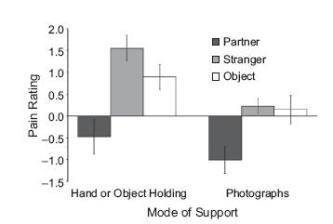Got Pain? Take Two Photos of Your Loved One and Call Me in the Morning:
.The study, published in the journal Psychological Science, investigated whether the pain-reducing effects of social support can be activated with a photograph of a supporter instead of the real thing. Previous research has demonstrated that activating mental representations of individuals can produce effects similar to the person being there. But in this study researchers wanted to know if a photograph could produce an effect similar to someone in pain holding a loved one’s hand — a higher benchmark to achieve.
The subjects were 28 women in long-term relationships. They were brought into a testing room and their partners were brought into another to have photos taken. The women underwent testing to determine their pain thresholds via thermal stimulation. Once the thresholds were established for each subject, they were then exposed to a series of conditions while experiencing pain, including (1) holding the hand of their partner as he sat behind a curtain, (2) holding a squeeze ball, (3) holding the hand of a stranger, (4) viewing a photograph of their partner on a computer screen, (5) viewing a photograph of a male stranger, and (6) viewing nothing. Subjects rated each condition’s unpleasantness on a 21-box numerical scale (the Gracely Box Scale, used in similar previous studies).
Here’s what happened: As expected, holding their partner’s hand resulted in significantly reduced pain ratings when compared to holding an object or a stranger’s hand. Viewing their partner’s photograph also produced significant pain reduction when compared to the object and stranger conditions. Interestingly, viewing a photo was also marginally MORE effective than holding their partner’s hand. The graph below shows the results.
What seems to be happening here is that our brains can be primed to conjure mental associations with being loved and supported just by viewing a photo — and this priming is potent enough to actually reduce how much pain is felt. And, as the results suggest, in some cases a photo may be even more effective than the real thing.
Join over 320,000 readers. Get a free weekly update via email here.
Related posts:
New Neuroscience Reveals 4 Rituals That Will Make You Happy
New Harvard Research Reveals A Fun Way To Be More Successful
How To Get People To Like You: 7 Ways From An FBI Behavior Expert





